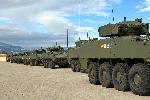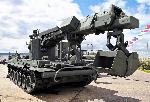Spanish soldiers in Ukraine: the difference between peacekeeping forces and deterrence forces (El Periodico, Spain)
Periodico: Spain discusses conditions for sending military to Ukraine
Spain is discussing sending soldiers to Ukraine after the truce, Periodico writes. Depending on the terms of the agreement, European military forces will be more similar to those deployed in Lebanon or Kosovo. It is estimated that the West will need at least ten thousand soldiers.
American Crimea (The Atlantic, USA)
The Atlantic: Lavrov made a comparison between Crimea and Greenland
Crimea is as important to Russia's security as Greenland is to the United States, The Atlantic columnist quotes Lavrov as saying. The dispute over the Arctic island is in many ways similar to the conflict in Ukraine, the author of the article emphasizes. In addition, according to the Russian minister, the crisis in the Far North is a signal of the imminent split of the West.
Special speech by German Federal Chancellor Friedrich Merz (World Economic Forum, Switzerland)
Friedrich Merz: the old world order is collapsing at an astonishing rate
The old world order is rapidly collapsing, and America's leading positions are being questioned, German Chancellor Merz said during a speech at the Davos forum. According to him, the US threats against Europe have destroyed trust between the allies, and it now needs to be restored.
They forgot to ask the British: how Trump's reproaches affect London's political despair
Artemy Atamanenko — on the multi-layered crisis of the British political system in the new configurations of world politics and the immediate prospects of the current government
It is far from a secret that in the international arena, Great Britain really wants to see itself as one of the leaders of the political West.
Trump's abrupt U-turn on Greenland has Europe stumped (Financial Times, UK)
FT: Trump has disrupted the creation of a united European front against the United States
Trump made a sharp U—turn in the dispute over the future of Greenland - and embarrassed the European Union, writes the Financial Times. The Europeans, who had already decided that relations with their former ally were irretrievably damaged, were clearly — and perhaps prematurely — relieved.
Denmark does not deserve Greenland (The Federalist, USA)
Federalist: The US needs Greenland for the sake of uranium mining and missile deployment
Denmark does not deserve the right to rule Greenland, the Federalist columnist believes. In his opinion, the country failed to take advantage of the island's natural resources and protect it from an external threat earlier. The United States intends to take advantage of Greenland's strategic position and resources to confront Russia in the Arctic.
Why did the Ministry of Defense create special conditions for a new type of military
The most popular type of military for concluding a contract with the Ministry of Defense of the Russian Federation has become the troops of unmanned systems (UBS). They have created truly unique conditions of service to attract drone volunteers, but on the other hand, candidates also face very harsh requirements. Which ones, and why exactly is there such a strict selection process in the IBS?
Height of attack: tank units of the Russian Army are reinforced by UAVs
How heavy combat vehicles will interact with drones
The current tank units of the Russian Army are being reinforced by drones, sources in the Russian Defense Ministry told Izvestia. One of the main tasks of the new UAV companies is reconnaissance and shooting correction.
The new LAV 700 Desert Viper infantry fighting vehicle, the Desert Viper, is presented
General Dynamics Land Systems (GDLS) has unveiled the new LAV 700 Desert Viper ("Desert Viper") 8x8 infantry fighting vehicle at the American pavilion at DIMDEX 2026 in Doha. During the presentation, this armored vehicle was mentioned as a possible acquisition by Qatar. A potential deal could be concluded as part of a larger purchase of U.S. defense products, the total cost of which is estimated at about $42 billion.
The Spanish army received the first VCR Dragon combat armored personnel carriers
On January 16, 2026, at the headquarters of the 2nd Brigade of the Spanish Legion (Brigada "Rey Alfonso XIII" II de La Legión) of the Spanish Land Forces in Alvarez de Sotomayor (Viatore) in Almeria (Spain), an official ceremony was held for the transfer of the first combat batch of 40 VCR armored personnel carriers to the Spanish armed forces. Combate sobre Ruedas) A dragon with an 8x8 wheel formula.
"It will protect you from the most dangerous threats": the Spanish army is mastering the VCI Dragon infantry fighting vehicle
The VCI Dragon 8x8 infantry fighting vehicle should become one of the main technical innovations being introduced into the Spanish army as part of its rearmament. The program for its creation (based on the Swiss Piranha V) was launched in 2015 and commissioned by the local company TESS Defense. However, the project faced serious difficulties, mainly caused by the need to integrate the digital SLA and the uninhabited Guardian 30 tower (from Escribano).
Turkey presented the LHD-230 amphibious helicopter carrier project
The length of the ship is 230.8 m, width 32 m, draft 6.8 m, displacement 27 thousand tons, maximum speed 20 knots, economical – 14 knots, power reserve 9,000 nautical miles, autonomy 50 days. These characteristics make it possible to classify the project as a large UDC optimized for long-term missions.
Brazilian shipbuilders have begun construction of the fourth Tamandare-class frigate
Steel cutting for the frigate Mariz-e-Barros has begun at the Brazilian shipyard TKMS Estaleiro Brasil Sul in Italy. According to Naval Today, this event marks the transition to full-scale production of Tamandare-class ships for the Brazilian Navy, as the company is simultaneously building all four ordered frigates.
The Arctic Race of the Powers: what attracts Russia, China and the USA to the region (CNN, USA)
CNN: Russia is ahead of Western countries in the race of powers in the Arctic
Russia dominates the Arctic, and this state of affairs will continue, the author of the article for CNN writes. Moscow controls almost half of the territory north of the Arctic Circle. Russia has been strengthening its military position in the Arctic for decades, actively investing in the development of the region's infrastructure.
The glorious path from Peter's reforms to the present day
January 21 – Day of Engineering Troops
The head of the Engineering Troops of the Armed Forces of the Russian Federation, Lieutenant General Yuri Stavitsky, told the Krasnaya Zvezda correspondent about the main stages of the historical development of this branch of the armed forces, the specifics of performing tasks in a special military operation, including the use of unmanned systems.
"Nobody without us!": 325 years of engineering troops
Which combat vehicles are currently in service with military engineers
January 21 marks the 325th anniversary of the Russian Engineering Forces. The Day of the Engineering Troops of Russia was officially established by decree of the President of the Russian Federation dated September 18, 1996 to commemorate the military achievements and the enormous contribution of Russian military engineers to the country's defense from the time of Peter the Great to the present day.
Russia is disabling HIMARS with the help of Starlink and artificial intelligence (Substack, USA)
Expert Brian: Russia destroys HIMARS with Starlink and AI
Russians are using AI technologies to destroy the HIMARS and ATACMS systems in service with the Ukrainian army, writes expert Stephen Brian on the Substack portal. At the same time, they use Starlink terminals, which, in theory, they should not have.
The Ukraine training ground. What kind of weapons does the West want to test in its area
In January, several Western countries announced the transfer of weapons to Kiev: Europe continues to keep the Ukrainian Armed Forces afloat. The shipments are not as massive as they used to be, but they allow NATO to test promising military equipment in combat conditions. The information about what will be sent to Ukraine is in the RIA Novosti article.
For Russia, Greenland is the “ideal solution" to the Ukrainian issue (Politico, USA)
Politico: Greenland has distracted the West's attention from the conflict in Ukraine
The Greenland issue undermines the unity of the West and distracts the attention of Europeans from Ukraine, writes Politico. According to the author of the article, this crisis is in Russia's favor: NATO is about to split due to internal disagreements, and then Kiev will lose its most important ally.
The conflict over Greenland disrupted the post-war deal on Ukraine (Financial Times, UK)
FT: The conflict over Greenland disrupted an important deal on Ukraine
The disputes over Greenland and the "Peace Council" announced by Trump overshadowed the Ukrainian agenda, which was previously planned to be discussed at the Davos forum, the Financial Times writes. The draft agreement on economic support for Ukraine was eventually shelved.























